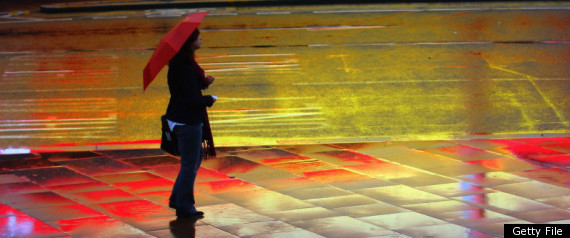Radiation In Massachusetts Rainwater Likely From Japan -- Health officials said Sunday that one sample of Massachusetts rainwater has registered very low concentrations of radiation, most likely from the Japanese nuclear power plant damaged earlier this month by an earthquake and tsunami.
John Auerbach, the Massachusetts commissioner of public health, said that radioiodine-131 found in the sample – one of more than 100 that have been taken around the country – has a short life of only eight days. He said the drinking water supply in the state was unaffected and officials do not expect any health concerns.
Nevada and other Western states also have reported minuscule amounts of radiation, but scientists say those presented no health risks.

The Massachusetts Department of Public Health said the in-state sample was taken in the past week, but they did not say where. The testing is part of a U.S. Environmental Protection Agency network that monitors for radioactivity.
State officials said similar testing was done in California, Pennsylvania, Washington and other states, and showed comparable levels of I-131 in rain.
Massachusetts testing last week of samples from the Quabbin and Wachusett reservoirs showed no detectable levels of I-131, health officials said.
Energy and Environmental Affairs Secretary Richard K. Sullivan Jr. directed the Department of Environmental Protection to collect additional samples for testing from several water bodies across Massachusetts. Results will be available over the next several days.
In Japan, mounting problems, including miscalculated radiation figures and inadequate storage tanks for huge amounts of contaminated water, stymied emergency workers Sunday as they struggled to bring the country's nuclear complex back from the edge of disaster. Workers were trying to remove radioactive water from the nuclear compound and restart the regular cooling systems for the dangerously hot fuel. ( huffingtonpost.com )
John Auerbach, the Massachusetts commissioner of public health, said that radioiodine-131 found in the sample – one of more than 100 that have been taken around the country – has a short life of only eight days. He said the drinking water supply in the state was unaffected and officials do not expect any health concerns.
Nevada and other Western states also have reported minuscule amounts of radiation, but scientists say those presented no health risks.

The Massachusetts Department of Public Health said the in-state sample was taken in the past week, but they did not say where. The testing is part of a U.S. Environmental Protection Agency network that monitors for radioactivity.
State officials said similar testing was done in California, Pennsylvania, Washington and other states, and showed comparable levels of I-131 in rain.
Massachusetts testing last week of samples from the Quabbin and Wachusett reservoirs showed no detectable levels of I-131, health officials said.
Energy and Environmental Affairs Secretary Richard K. Sullivan Jr. directed the Department of Environmental Protection to collect additional samples for testing from several water bodies across Massachusetts. Results will be available over the next several days.
In Japan, mounting problems, including miscalculated radiation figures and inadequate storage tanks for huge amounts of contaminated water, stymied emergency workers Sunday as they struggled to bring the country's nuclear complex back from the edge of disaster. Workers were trying to remove radioactive water from the nuclear compound and restart the regular cooling systems for the dangerously hot fuel. ( huffingtonpost.com )
No comments:
Post a Comment